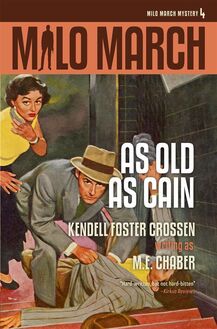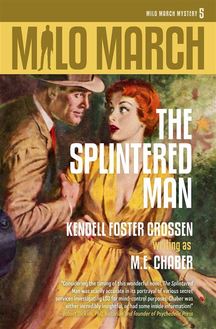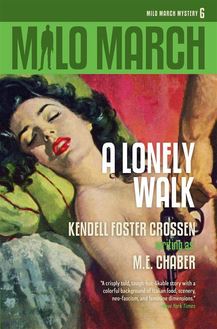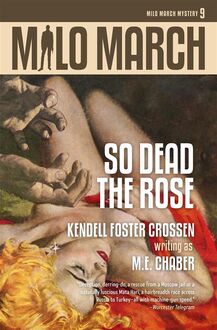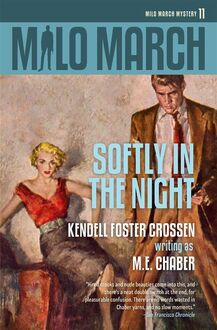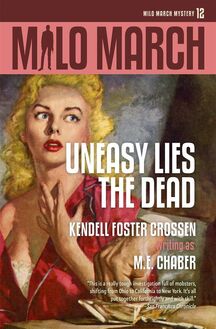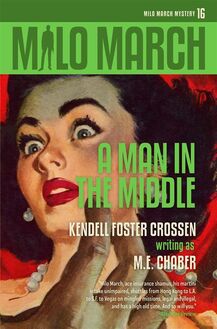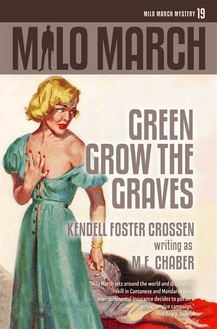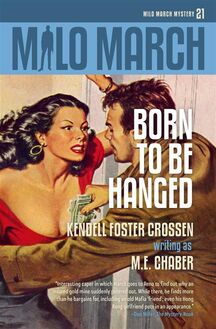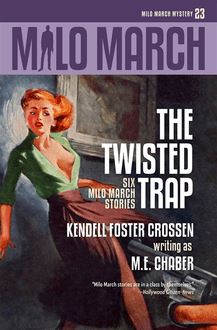-
 Univers
Univers
-
 Ebooks
Ebooks
-
 Livres audio
Livres audio
-
 Presse
Presse
-
 Podcasts
Podcasts
-
 BD
BD
-
 Documents
Documents
-
- Cours
- Révisions
- Ressources pédagogiques
- Sciences de l’éducation
- Manuels scolaires
- Langues
- Travaux de classe
- Annales de BEP
- Etudes supérieures
- Maternelle et primaire
- Fiches de lecture
- Orientation scolaire
- Méthodologie
- Corrigés de devoir
- Annales d’examens et concours
- Annales du bac
- Annales du brevet
- Rapports de stage
La lecture à portée de main
Vous pourrez modifier la taille du texte de cet ouvrage
Découvre YouScribe en t'inscrivant gratuitement
Je m'inscrisDécouvre YouScribe en t'inscrivant gratuitement
Je m'inscrisEn savoir plus
Vous pourrez modifier la taille du texte de cet ouvrage
En savoir plus

Description
Some say Gruss suffers from a dread disease and is being treated in East Berlin with the latest wonder drug by his friend Dr. Oderbruch. Milo suspects that Oderbruch, a former Nazi, is experimenting on Gruss, bouncing him in and out of insanity like a yo-yo by dosing him with LSD, then healing his “schizophrenia” with an antidote. Withholding the antidote is a handy way to squeeze information out of Gruss, and the drug experiments are part of a larger, fiendish project involving mind control of the military.
In his effort to gain access to Oderbruch and find Gruss, Milo ends up in the arms of the lustful Frau Beate, who plies him with Soviet champagne and vodka. Milo is reasonably safe if hangovers are the only menace. But when his disguise as a Russian secret-police agent is blown, he is packed off to a mental hospital. There he joins Gruss as the doctor’s latest guinea pig.
Milo survived a marathon interrogation by the Communists during his last mission. But this is different—the hallucinogenic effects of LSD threaten to splinter his mind into pieces. How will he escape the closely guarded hospital, bringing both Gruss and the evil Oderbruch back with him to the West? Milo’s quick-witted action and sheer nerve, not to mention his irreverence toward authority figures on both sides, make for the wildest trip of all—an insane car chase back to the Free World.
Sujets
Informations
| Publié par | Steeger Books |
| Date de parution | 08 juin 2020 |
| Nombre de lectures | 0 |
| EAN13 | 9788835875529 |
| Langue | English |
Informations légales : prix de location à la page 0,0012€. Cette information est donnée uniquement à titre indicatif conformément à la législation en vigueur.
Extrait
The Splintered Man
by
Kendell Foster Crossen
Writing as M.E. Chaber
With an Afterword by Kendra Crossen Burroughs
Steeger Books / 2020
Copyright Information
Published by Steeger Books
Visit steegerbooks.com for more books like this.
©1983, 2020 by Kendra Crossen Burroughs
The unabridged novel has been lightly copyedited by Kendra Crossen Burroughs.
All rights reserved. No part of this book may be reproduced or utilized in any form or by any means, electronic or mechanical, without permission in writing from the publisher. The scanning, uploading, and distribution of this book via the Internet or via any other means without the permission of the publisher is illegal and punishable by law.
Publishing History
Hardcover
New York: Rinehart & Co., October 1955.
Toronto: Clarke, Irwin & Company, November 1955.
London: T. V. Boardman (American Bloodhound Espionage Mystery #145), 1957. Dust jacket by Denis McLoughlin.
Paperback
New York: Mystery Guild, March 1956.
New York: Permabook #M-3080, April 1957. Cover by Robert E. Schulz.
New York: Paperback Library (63-306), A Milo March Mystery, #7, April 1970. Cover by Robert McGinnis.
Vivamus, mea Martha, atque amemus …
Author’s Note
Two drugs are mentioned prominently in this novel. Everything said about lysergic acid diethylamide (LSD) is as accurate as I could make it. I have taken certain liberties with chlorpromazine in extrapolating the uses to which it may still be put. As for the rest, while actual events and the names of actual organizations and persons are generously sprinkled through the novel—we live in an age where reality borrows heavily from fiction, and fiction must return the compliment in order to survive—it is purely a product of the author’s imagination. None of the characters is meant to portray any person living or dead. Aside from that, any similarity to the world about us is entirely intentional.
M.E.C.
One
Ten years is a long time. That was how long it had been since I took off my uniform, put on a civilian suit, and, with my discharge papers making a warm spot in my pocket, went out to buy the loudest tie I could find. The war was over. They were never going to catch me playing footsie with the Army again.
I was still a reserve officer. For a while that worried me, but the years rolled by and nothing happened. I kept busy as an insurance investigator, working out of Denver, Colorado. I galloped past the middle thirties, getting a couple of inches thicker in the middle, and began to feel that the Defense Department was no longer breathing down the back of my neck. I got married and acquired a son the same day—by adoption. I felt I was beginning to make quite a career out of being a civilian.
That was when they hit me. It was a day that started out like any other day. I got up fairly late and looked at the mail while I had my breakfast. In the middle of it, my coffee turned to wormwood. There was a little note that said I was to report the following day, in uniform, for active duty.
My breakfast was ruined, so I went down to the office. First I tried to find out why the Army once more had designs on me. I talked to some bright young lieutenant who knew from nothing. Next I tried to pull my few little strings. I made a call to a general I knew in Washington. He wasn’t in, or, at least, that’s what the efficient WAC said. I suspected that she had to ask him first. That should have tipped me off, but it didn’t.
I went in to see the man I worked for. His name was Niels Bancroft and he didn’t value a dollar any more than his jugular vein. But he had one weak spot. He believed that people—other people—should jump at the chance to work for the government. He had once loaned me to the State Department. The fact that I was being recalled by the Army brightened up his entire day. He told me to take the rest of the day off to buy my uniform and assured me my job would be waiting even if I didn’t get out for another fifteen years. The cheerful approach.
Working out careful plans for a personal vendetta, I bought a uniform. One, going on the forlorn premise that the Army would realize they’d made a mistake. Then I went home and sulked. The next morning I disguised myself as an officer and a gentleman and went downtown. I was sworn in by a vacant-eyed colonel, who wasn’t any brighter than the lieutenant. Then I was given my orders. I was to proceed immediately by plane to Washington, D.C. That was all.
“What the hell do I do when I get to the Washington airfield?” I asked. “Just hang around the coffee shop until the Chief of Staff drops in for a cup of coffee?”
“I really couldn’t say,” the colonel said. He was staring somewhere over my left shoulder. “I imagine you’ll receive new orders upon landing. Have a nice flight, Major.”
“Thanks,” I said dryly.
I went out to the Denver airport and got on a plane. It was getting dark when we landed in Washington. As I came off the plane I heard my name on the loudspeaker. I was wanted at the information counter.
A very pretty WAC sergeant was waiting there. Blonde and stacked. Even the military couldn’t figure out a way to cut a uniform to hide her curves. If she’d been a French model, Christian Dior would’ve had a nervous breakdown.
When I’d identified myself, she saluted and handed me an envelope. Sealed orders, just like in the movies. I ripped it open and looked at the single sheet of paper. It gave an address and an office number. I was to report there at twenty hundred. I looked at my watch. I had about fifteen minutes.
“They must be afraid I’ll wander around and be picked by a recruiting officer,” I said. “Or that I’ll buy a sandwich and stick it on an expense account.”
The WAC stared at me, big-eyed, and I realized I wasn’t showing the old team spirit.
I read the address aloud. “Where is it?”
“About ten minutes away, sir,” she said.
“Okay,” I said. “I’ll get a cab and go over.”
“I have a car outside, sir. My orders are to drive you to your destination.”
I looked her over again. “The Army’s improving in one respect,” I said. “The escort service is better, but they don’t allow enough time to take advantage of it. I must speak to the General about it.”
She turned without answering and led the way out of the terminal. I followed, enjoying the view. She was probably wearing a Government Issue girdle, but the movement was strictly her own. That was one maneuver the Articles of War had forgotten to take into consideration.
There was an Army car in front of the terminal. We climbed in and she started the motor.
“What is this place?” I asked.
“I don’t know, sir.” She slipped the car expertly into the stream of traffic.
“That’s what I like about the Army,” I said, lighting a cigarette. “Nobody ever knows anything. Well, I don’t suppose they’ll put me on a night shift. How about hanging around until I’ve reported in and then you can show me around? I’m ten years behind on latrine gossip.”
She looked as shocked as if I’d suggested raping her in the lobby of the Pentagon. “I couldn’t, sir,” she said. “My orders are to report back to my superior as soon as I’ve delivered you to your destination.”
“At ease, Sergeant,” I said, grinning. “Stop quivering your stripes at me.”
She laughed and continued to concentrate on her driving.
The address turned out to be an ordinary office building. I got out of the car, took a last look at the sergeant’s military profile, and went in. The office number I wanted was 321. I took the elevator to the third floor. A moment later I was reading my orders over for the third time and wondering who was crazy. There was no 321.
I wandered up and down the corridors several times. Most of the offices were dark. And there was no 321. Finally I decided that somebody had goofed and to hell with it. I headed back for the elevators.
There was a young man standing in front of them. He watched me come down the corridor.
“Looking for something, Major?” he asked.
“Yeah,” I grunted. “Three twenty-one.”
He shook his head. “No such number on this floor. Who’re you looking for?”
It was a casual question. Too casual. I took a closer look at him. Everything about him was just a little too casual. I began to get annoyed.
“I came to Washington to improve my golf game,” I said. “I need a few lessons on my chip shots, only I don’t have a chippy. I thought maybe I’d find one here.”
I was right. His face got a little red. West Point cholera. They all get it when they’re not in a position to pull rank.
“I was just trying to be helpful,” he said. He was still trying to sound like an aggrieved citizen, but it was counterfeit.
“Sure,” I said. “But you’re a bird dog. I can smell them. They’ve all got that doggy smell—if you know what I mean.”
He knew what I meant. His face got a darker red. “You’re to go to room three sixteen,” he said stiffly.
I lit a cigarette and tossed the match at his feet. “I don’t like games.
-
 Univers
Univers
-
 Ebooks
Ebooks
-
 Livres audio
Livres audio
-
 Presse
Presse
-
 Podcasts
Podcasts
-
 BD
BD
-
 Documents
Documents
-
Jeunesse
-
Littérature
-
Ressources professionnelles
-
Santé et bien-être
-
Savoirs
-
Education
-
Loisirs et hobbies
-
Art, musique et cinéma
-
Actualité et débat de société
-
Jeunesse
-
Littérature
-
Ressources professionnelles
-
Santé et bien-être
-
Savoirs
-
Education
-
Loisirs et hobbies
-
Art, musique et cinéma
-
Actualité et débat de société
-
Actualités
-
Lifestyle
-
Presse jeunesse
-
Presse professionnelle
-
Pratique
-
Presse sportive
-
Presse internationale
-
Culture & Médias
-
Action et Aventures
-
Science-fiction et Fantasy
-
Société
-
Jeunesse
-
Littérature
-
Ressources professionnelles
-
Santé et bien-être
-
Savoirs
-
Education
-
Loisirs et hobbies
-
Art, musique et cinéma
-
Actualité et débat de société
- Cours
- Révisions
- Ressources pédagogiques
- Sciences de l’éducation
- Manuels scolaires
- Langues
- Travaux de classe
- Annales de BEP
- Etudes supérieures
- Maternelle et primaire
- Fiches de lecture
- Orientation scolaire
- Méthodologie
- Corrigés de devoir
- Annales d’examens et concours
- Annales du bac
- Annales du brevet
- Rapports de stage
